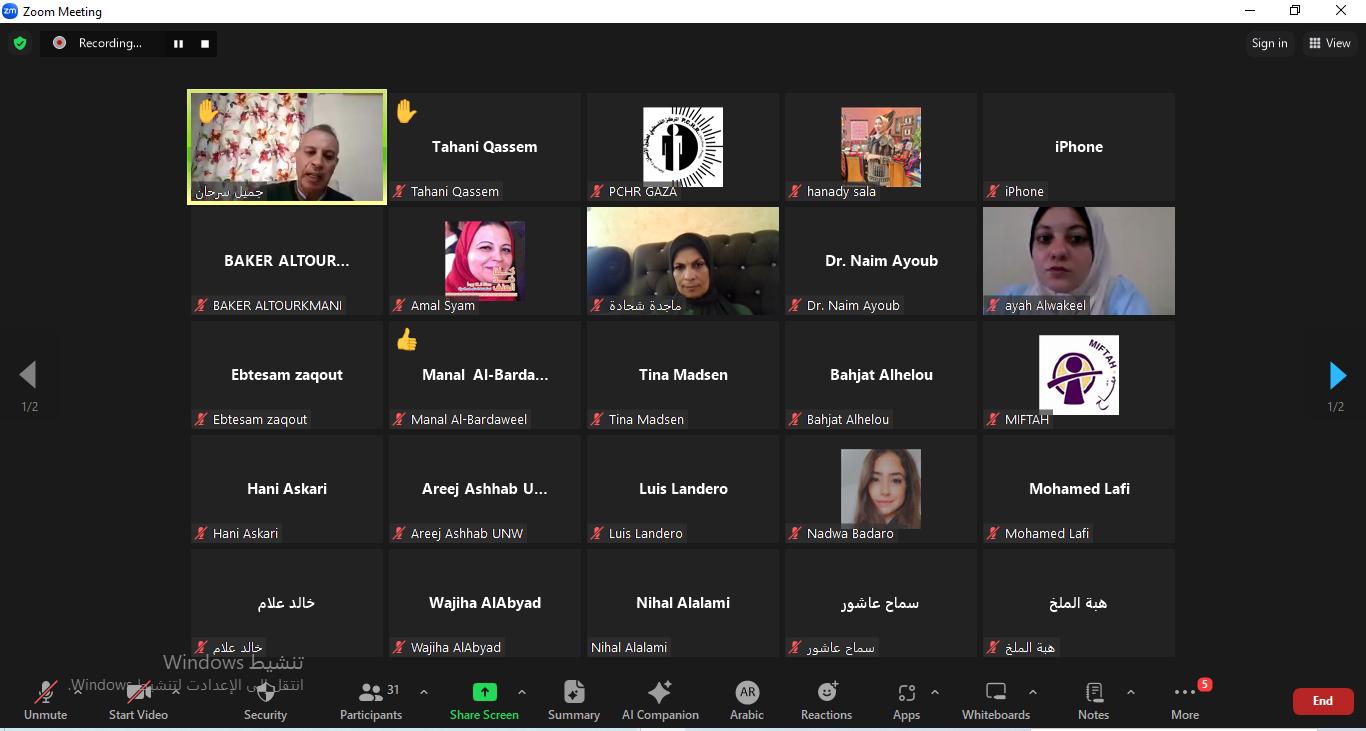
On Thursday, 29 August 2024, The Women’s Unit at the Palestinian Centre for Human Rights (PCHR) organized a workshop via Zoom titled “The Crime of Preventing Births within Gaza Strip: Legal and Humanitarian Dimensions.” The workshop aimed at shedding light on the Israeli violations against women in the Gaza Strip and the Israeli-imposed measures intended to prevent births as part of the crime of genocide. The workshop was attended by representatives of human rights and women’s rights organizations, as well as representatives from international organizations and diplomatic corps, as simultaneous interpretation was provided.
Ms. Majda Shehadah, Deputy Head of PCHR’s Women’s Unit, opened the workshop, welcoming the attendees and highlighting the unprecedented Israeli violations against women in the Gaza Strip as part of the ongoing crime of genocide. Shehadah noted that direct Israeli military attacks have led to the killing of more than 11,207 women. Additionally, women are forcibly displaced from their homes, finding themselves in makeshift tents having neither privacy nor a decent life. Shehadeh added that reports have documented the arbitrary detention of more than 100 women under harsh and degrading conditions. She elaborated that the lack of medical equipment and basic supplies has led to a deterioration in healthcare for women, particularly pregnant and breastfeeding mothers, putting their lives and the lives of their children at risk. Moreover, women suffer from deep psychosocial consequences due to the loss of their beloved, their homes, and security.
Lawyer Aya Al-Wakeel, a researcher at PCHR’s Women’s Unit, presented a framework for the legal aspects of the crime of preventing births. She reviewed the IOF’s acts in the Gaza Strip, including killing Palestinians, inflicting severe physical and mental harm, and inflicting on them conditions of life calculated to bring about their physical destruction in whole or in part. Al-Wakeel focused on the crime of genocide, particularly the act of imposing measures intended to prevent births within Gaza Strip amid the lack of protection for pregnant women from military attacks, which ultimately lead to their death, injury, or exposure to toxic gases, not to mention the mental and physical harm induced by fear and anxiety. She also tackled the inadequate healthcare services and the difficulty of accessing them due to IOF’s attacks on hospitals, healthcare centers, and ambulances, increasing reproductive health risks such as miscarriages and premature births. These measures are compounded by harsh living conditions, including the policy of starvation, where 95% of pregnant women suffer from severe food insecurity, alongside repeated displacements, the spread of epidemics, and deteriorating living conditions in tents and shelters, all of which exacerbate the suffering of pregnant women and prevent births within the Gaza Strip.
Dr. Na’eem Ayoub, Medical Director at Al-Sahaba Medical Complex, displacedt the challenges facing maternal and newborn healthcare at the complex, the only remaining facility in northern Gaza for expectant mothers. He explained that the shortage of essential medical supplies, medicines, and vitamins, along with the scarcity of specialized medical personnel in northern Gaza, increases the risks of pregnancy complications that may threaten the life of the mothers or babies. The exposure of pregnant women to Israeli attacks complicates the management of these cases, leading to higher rates of miscarriages and birth defects. He also noted the decrease in monthly childbirth cases at the hospital prior to the war from 500 to 120, due to the continued displacement and the lack of privacy between spouses.
At the conclusion of the workshop, participants presented significant recommendations to raise awareness on the crime of preventing births as an act of genocide. They emphasized the need to strengthen and unify efforts between local and international bodies to protect women’s rights and ensure accountability and justice. The participants recommended the following:
Stop the ongoing genocide against the civilians in the Gaza Strip, including pregnant women and newborns.
Raise international and local awareness on the Israeli-imposed measures intended to prevent births as part of the crime of genocide in the Gaza Strip, and pressure the international community to take tangible steps to protect women’s rights and ensure accountability for the perpetrators of this crime.
Enhance healthcare services for pregnant women by increasing the number of primary healthcare centers and field hospitals in various displacement shelters and camps to ensure pregnant women’s safe and continuous access to healthcare amid these difficult circumstances.
Boost coordination between humanitarian organizations and healthcare institutions to provide urgent and sustainable support for women and children across the Gaza Strip.